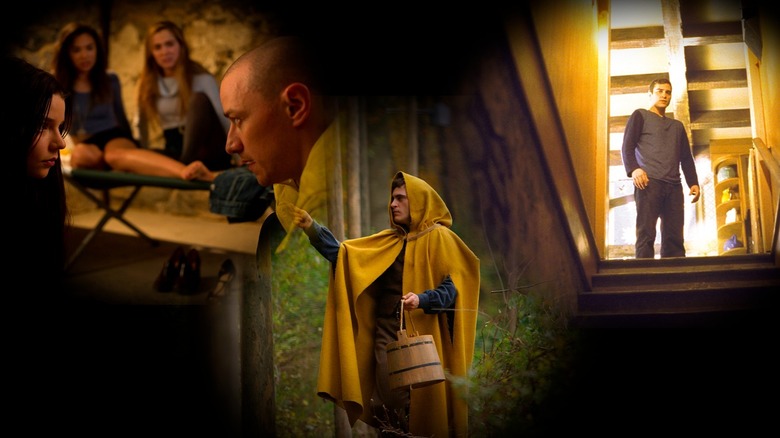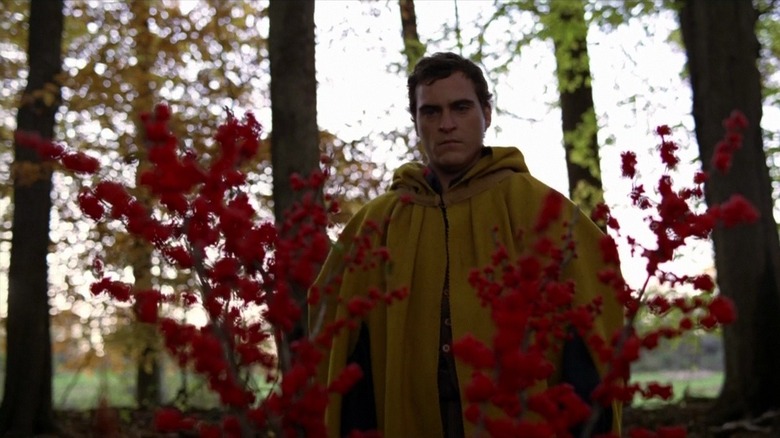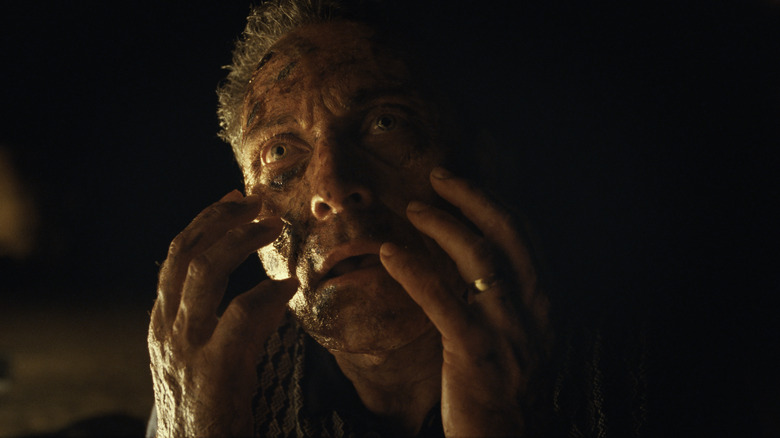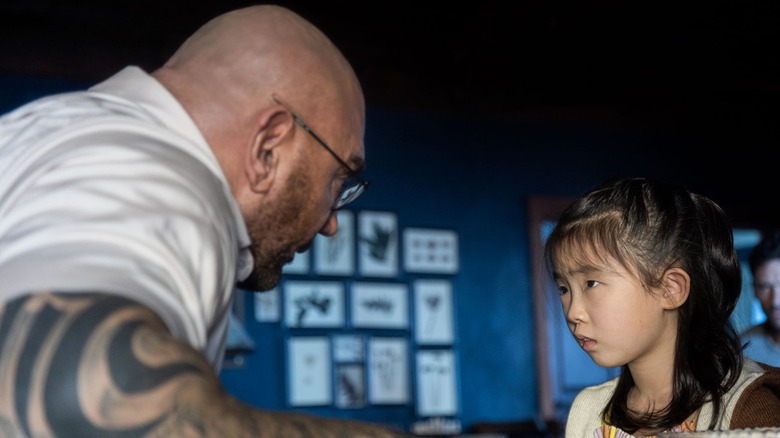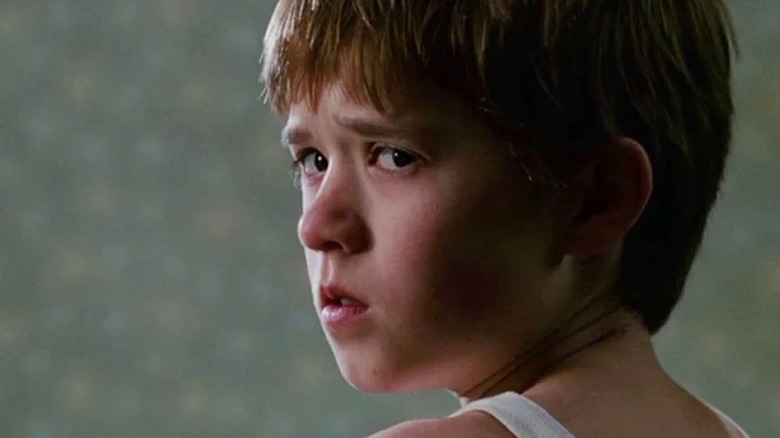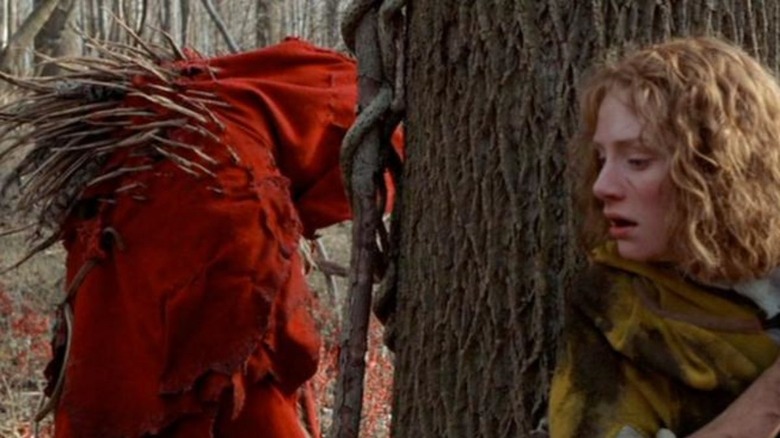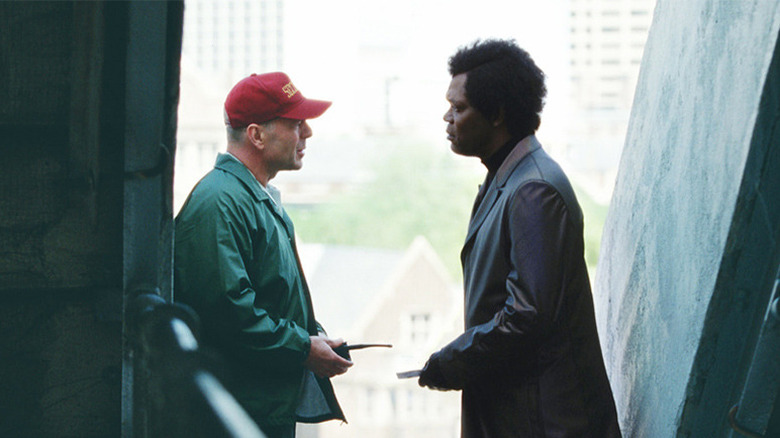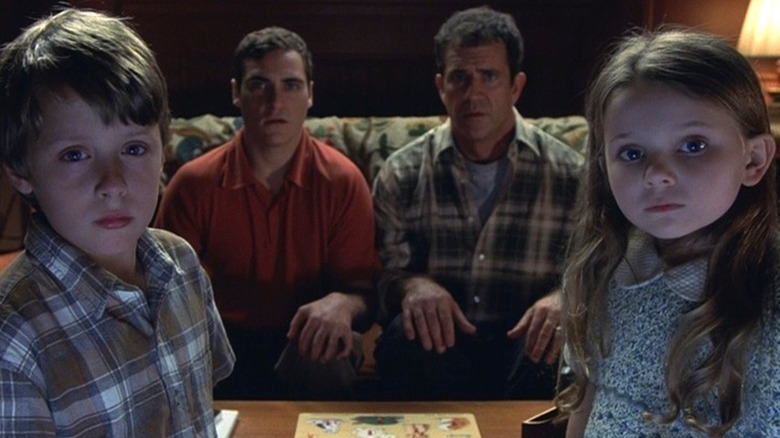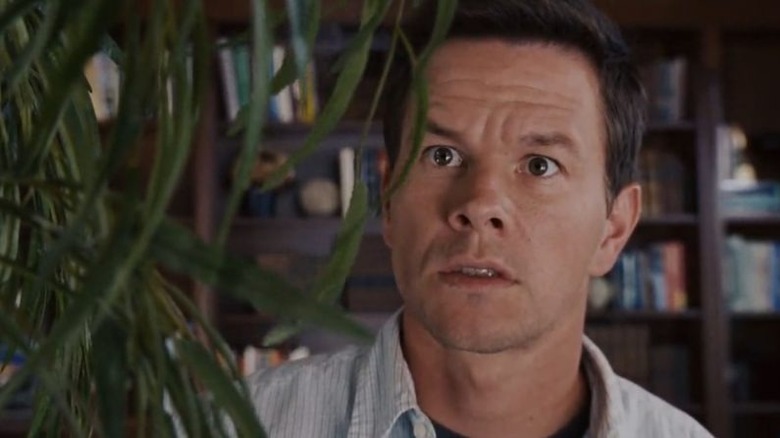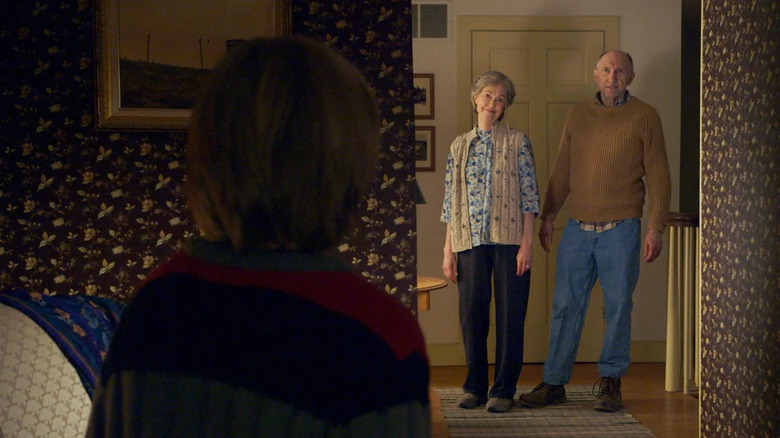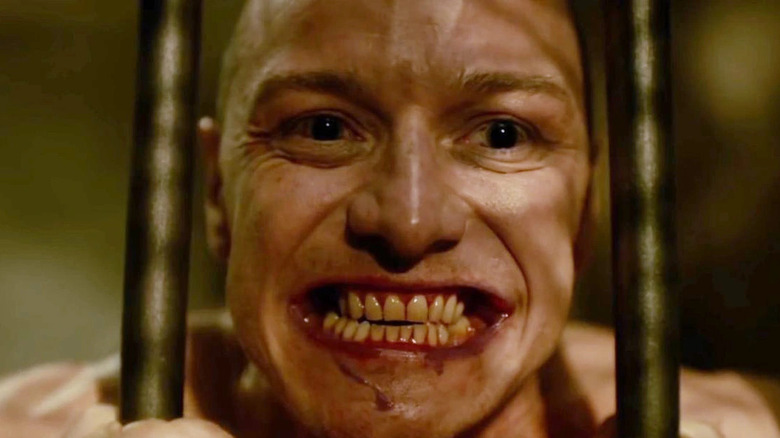Every M. Night Shyamalan Movie Twist Ranked By Unpredictability
The following post contains spoilers for nine M. Night Shyamalan movies, including "Knock at the Cabin."
Many casual fans don't know this, but "The Sixth Sense" wasn't M. Night Shyamalan's first feature film. It was his third, after "Praying with Anger" and "Wide Awake," but it defined his reputation as a maker of eerily quiet, slow-paced thrillers with a "Twilight Zone" vibe and (usually) big twists at the end. Initially, this formula was so successful that some began referring to Shyamalan in the same sentence as Steven Spielberg, but then he took some bigger swings — without the twists — and things didn't work out so well. So, after being humbled by big-budget disappointments like "The Last Airbender" and "After Earth," Shyamalan went back to basics, making films with lower budgets, more suspenseful plots, and yes, big twists. Of late, he's taken to adapting books and actually changing the endings, surprising readers while putting his own stamp on things.
Some of Shyamalan's big reveals, though, are way more obvious than others. One film actually has two; his first two features don't have any. Same for the aforementioned big-budget humblings. "Lady in the Water," meanwhile, is so incoherent that it's hard to tell what the plot is, let alone if it ends with a surprise, and "Glass" just kind of peters out. The rest of his oeuvre, however, is pretty twist-heavy. Here's each ranked by its actual unpredictability, from least to most surprising.
10. The Village — Twist #2
The premise: Residents of a 19th-century Pennsylvania village fled their original residences to form a new settlement deep in the woods. Unfortunately, the woods are inhabited by monsters, dubbed "Those We Don't Speak of," who get testy when anyone enters their territory unsanctioned.
The twist: It's actually the 21st century, and the residents of the village all met at grief counseling. They've retreated from the world, and thanks to a lucrative family fortune, isolate themselves on a large patch of land that remains guarded and walled off. It's even in a no-fly zone.
The surprise factor: Not much. Three films after "The Sixth Sense," fans were starting to cotton on to what Shyamalan was up to, and on movie message boards and websites, folks quickly guessed what was really happening. That Shyamalan cast himself as the park ranger who literally explains every beat of the plot made some audiences more likely to laugh than gasp. The convenient fact that protagonist Ivy (Bryce Dallas Howard) is blind, and thus never learns the truth even though she steps outside the preserve, only makes the whole plot feel even more contrived.
9. Old
The premise: Vacationers at a luxury resort find themselves trapped by unseen forces on a beach where time passes so quickly that they age years over the course of just a few hours. Adding to the danger, some of the victims start to develop bizarre medical conditions on top of rapidly aging. Every time that anyone tries to leave the beach, they pass out and find themselves right back where they started.
The twist: The resort is owned by a pharmaceutical company, which is looking to test the lifetime effects of its new drugs in a couple of days. The resort-goers have been selected for their medical conditions, and are secretly drugged via custom cocktails.
The surprise factor: The main surprise in "Old" is that, aside from some tossed-off theories about magnetic rocks, the movie never explains why the beach ages people so quickly. That's the reveal audiences want in a movie like this. Since it's obvious from the getgo that there's something sinister about the resort, and that the folks on the beach are being watched as they die of old age, the only mystery is who the bad guys are. Some variation of "evil corporation" seems to be the most likely answer. The twist might be a big surprise to readers of the graphic novel "Sandcastle," though. Ostensibly the basis for "Old," the comic doesn't end the same way.
8. Knock at the Cabin
The premise: Happy family Eric (Jonathan Groff), Andrew (Ben Aldridge), and their adopted daughter Wen (Kristen Cui) take a vacation to a remote cabin in the woods. Their peaceful getaway is soon interrupted by a group of four strangers led by the burly, soft-spoken Leonard (Dave Bautista), who claims they are there to prevent the apocalypse. Eric, Andrew, and Wen must agree to willingly sacrifice one of their own. If they don't, Leonard and his associates will kill themselves, one per day. The apocalypse will unfold after the last of them is dead. TV news broadcasts appear to back up Leonard's story, as well as his (supposedly) prophetic visions.
The twist: Though circumstantial evidence suggests the intruders may be homophobes enacting an elaborate revenge scheme, they turn out to be telling the truth. The apocalypse arrives after Leonard kills himself, and with planes falling from the sky and lightning consuming the landscape, Eric agrees to die, regaining his tentative faith. Andrew shoots him, and the end of the world abruptly ceases.
The surprise factor: It was always going to be 50-50. Either Leonard's telling the truth, or he isn't. Any further twist, like it all being a simulation or some sort of test, would risk retreading material from "Old" or "The Cabin in the Woods." Once again, though, Shyamalan surprises readers of the original book, "The Cabin at the End of the World," in which Wen dies and the apocalypse remains uncertain.
7. The Sixth Sense
The premise: Child psychologist Malcom Crowe (Bruce Willis) counsels 9-year-old Cole (Haley Joel Osment), who reveals to Crowe that he sees ghosts. With his new counselor's help, Cole comes to realize that while they may be scary, the spirits are mostly looking for help and don't realize they're dead. Cole also gives Crowe some pointers on how to talk to his estranged wife, Anna (Olivia Williams).
The twist: After taking Cole's advice to talk to his wife while she's asleep, Crowe realizes that he himself has been dead the whole time, having been shot and killed during the movie's opening sequence by a former patient (Donnie Wahlberg). Finally aware of his situation, his spirit is able to move on.
The surprise factor: Everyone has at least one smart-aleck friend who claims he figured out the twist immediately. That said, because the marketing sold the hell out of "I see dead people!" as the big reveal, and Shyamalan was a completely unknown quantity at the time, the actual twist shocked a whole lot of viewers, and contributed to the omnipresent "No Spoilers!" culture surrounding major movies.
On the other hand, movies and TV shows like "Jacob's Ladder," "Carnival of Souls," and "An Occurrence at Owl Creek Bridge" previously used versions of the same "dead the whole time" twist. It's up there with "It was all a dream" as an overused trope.
6. The Village — Twist #1
The premise: See above. A 19th-century village surrounded by mysterious creatures turns out to be a modern-day estate for grief-counseling patients who've collectively decided to live like it's the past, and to raise kids ignorant of the truth.
The (first) twist: The monsters, aka "Those We Don't Speak of," are actually the village elders in elaborate costumes pulling a Scooby-Doo. The audience learns this when Ivy ends up killing one, but since she's blind, she doesn't.
The surprise factor: Since viewers were expecting the whole "present day" reveal, the creatures' identity was a curveball, especially since we see what they look like early on and they're suitably grotesque, monster-movie creations. The trailers kept them hidden, so they could have turned out to be bulldozers or the like. Once we learn that they look like robed porcupine men with claws, it's a mini-mystery that distracts from the larger questions. Granted, it's a mystery that Velma Dinkley could solve pretty quickly, but nobody in "The Village" watches cartoons.
5. Unbreakable
The premise: With the help of a man named Elijah Price (Samuel L. Jackson), train-crash survivor and security guard David Dunn (Bruce Willis) slowly comes to realize that he has superhuman strength, extra-sensory intuition, and immunity to almost everything except drowning. With the help of his son, Joseph, and comic-book expert Price, Dunn gradually becomes a real-world superhero, using his enhanced abilities to catch and stop criminals.
The twist: As his intuition improves, Dunn shakes Price's hand, and realizes the latter been deliberately causing accidents to try to find a superhero to serve as his nemesis; as it turns out, Price is a self-styled supervillain called Mr. Glass, on account of his extra-fragile body.
The surprise factor: At this point, there was no reason to assume that Shyamalan would always do twists, so the reveal of Price as a villain came as a surprise to those who expected something more along the lines of a "Pulp Fiction" reunion. To anyone expecting a surprise, however, this is just about the only way the film could go, unless a surprise cameo appeared out of nowhere at the last minute. (Shyamalan would save that particular twist for the sequel.)
4. Signs
The premise: Following the appearance of mysterious crop circles, an alien invasion begins. The movie depicts it from the point of view of widower and former priest Graham Hess (Mel Gibson), his younger brother Merrill (Joaquin Phoenix), and his kids, Morgan (Rory Culkin) and Bo (Abigail Breslin).
The twist: The aliens are allergic to water, which makes it bizarre that they'd come to a planet so full of it. When one comes into the Hess house, Graham recalls his dying wife's words months earlier: "Swing away." He repeats them to Merrill, a former baseball player, who swings his bat at glasses of water left all over the house by Bo, who claimed they were polluted. The water splashes on the alien and kills it. Graham, now believing that his wife's words were a divine prophecy, regains his faith.
The surprise factor: The water vulnerability thing comes a bit out of nowhere, as a theory proposed by — you guessed it — the M. Night Shyamalan cameo character, once again providing exposition. It's easily mocked, but maybe Bo's theory that the drinking water was polluted is correct, and that's what hurt the alien. Regardless, the real twist is that Graham's wife's dying words were prophecy. This particular interpretation of God's interaction with humanity is of a piece with "A Knock at the Cabin," and it's not often given enough credit.
3. The Happening
The premise: A wave of mysterious suicides turns out to be caused by plants, which are attacking humanity with neuro-toxic pollen. High school science teacher Elliot Moore (hamburger salesman Mark Wahlberg) comes to believe the plants only target larger groups of people, and takes his family into the countryside to survive.
The twist: While there is no big surprise at the end, "The Happening" contains the funniest twist of any Shyamalan film. Encountering a potted plant, Elliot tries to persuade it not to hurt him, only to have the movie reveal once he's done that it's plastic. Andy Samberg's "Mark Wahlberg Talks to Animals" sketches on "Saturday Night Live" appear to be based on this one scene. Before it, a few people did Wahlberg impersonations, but now nearly everybody has one, which may explain why the former pants-dropping rapper doesn't have very nice things to say about the movie these days.
The surprise factor: Audiences mostly laughed at "The Happening" rather than with it, though there's plenty of evidence, like the lion scene, that it's actually meant to be funny. The fact that it was promoted as Shyamalan's first R-rated movie, though, may have led viewers to expect something more hardcore. Still, if anyone says they predicted a scene in which Wahlberg tries to negotiate peace with a plastic plant, they're lying.
2. The Visit
The premise: Teenagers Becca (Olivia DeJonge) and Tyler (Ed Oxenbould) spend a weekend with their grandparents, whom they've never met. Initially, the elder couple seem loving and happy to see the kids, but they have some strange house rules, and soon begin acting in creepy and unusual ways.
The twist: Those aren't the kids' grandparents! They're escaped mental patients who killed the real ones and took their places.
The surprise factor: Off the charts. This was Shyamalan's return to basics following "The Last Airbender" and "After Earth," neither of which had twists. The general expectation was that it would be a simple, low-budget thriller, but when the kids' mom, via video call, finally sees the elderly couple and realizes they aren't her parents, it's electric. "The Visit" wasn't just a fine return to form, but contained the second-best surprise Shyamalan has pulled off yet — and the next one was even better.
1. Split
The premise: Three young women are kidnapped by a man (James McAvoy) with multiple personalities, who takes them to his secret lair to either prepare or protect them for the coming of "The Beast," depending on which personality they ask.
The twist: While "The Beast" turns out to be another alternate personality, albeit one with superhuman strength and abilities, the real twist comes when he breaks free. The TV news reports of his crimes are observed by David Dunn (Bruce Willis), thus making "Split" a stealth sequel to "Unbreakable."
The surprise factor: Masterful misdirection. Viewers get so focused on the nature of "The Beast" that they aren't thinking about anything else until the actual reveal blindsides them from another angle. When Shyamalan originally made "Unbreakable," he talked about it as part of a trilogy. However, when asked over the intervening years whether or not he'd ever make the other two, he never sounded optimistic. It seems that Shyamalan was just biding his time, and made the follow-up when nobody was expecting it.
The final entry in the trilogy, "Glass," wasn't what many "Unbreakable" fans wanted, killing off David Dunn after teasing a big showdown that never quite happens. (As we now understand it, Bruce Willis' medical condition may have limited his participation.) It's an ending that still defies expectations, but it's more of a whimper than a twist.
